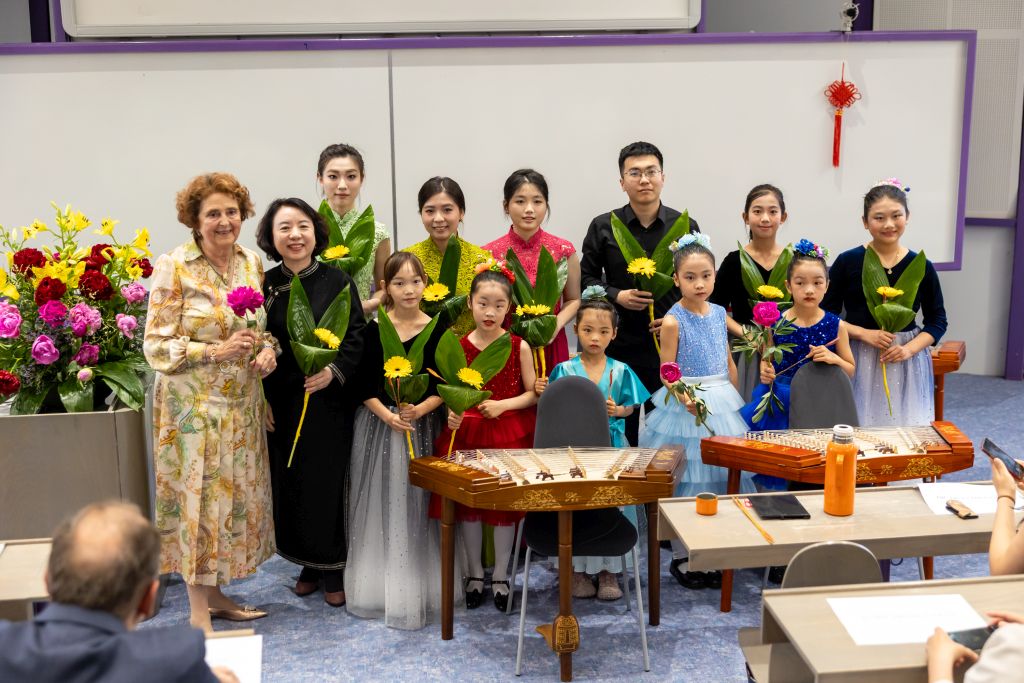Cultural Bridges and Exchange

A Vital Bridge for Enhancing Exchanges and Cooperation Between China and Slovenia
Danijela Voljč, MSc
Director of the Confucius Institute Ljubljana
Danijela Voljč, MSC
Director of the Confucius Institute Ljubljana at the Faculty of Economics, University of Ljubljana
Danijela Voljč is the Director of the Confucius Institute Ljubljana
at the Faculty of Economics, University of Ljubljana, where she has
been instrumental in promoting cross-cultural understanding and
academic collaboration between Slovenia and China.
With a strong
background in international relations, she also led the International
Relations Office at the Faculty, building global partnerships and
overseeing student and faculty mobility programs. Her professional
journey spans over four decades, from early roles in the banking
sector to senior academic management.
She holds a Master of Arts from
The American University in Washington, D.C. and is widely recognized
for her leadership in international education, program innovation, and
institutional development.

On May 28th, 2025, the Confucius Institute Ljubljana successfully held a ceremony celebrating its 15th anniversary. Over 100 distinguished guests from the business, education, and cultural sectors of both China and Slovenia gathered to celebrate this important milestone in the history of the Confucius Institute Ljubljana.
Among the honoured guests delivering speeches at the celebration were Prof. Qi Ming, Chairman of the University Council of SUIBE; Mr. Zhao Binghui, Chargé d’Affaires of the Embassy of China; Dr. Tomaž Turk, Dean of the School of Economics and Business; Dr. Dušan Mramor, former Dean of the School of Economics and Business; Dr. Zhang Shuihui, Deputy Director of the International Affairs Office; and Dr. Ding Zhonghui, lecturer at the School of Economics and Business.
In the opening remarks, Danijela Voljč, CI Director, noted that CI now has over 600 registered students. Over the past 15 years, CI has trained thousands of students, serving as a vital bridge for enhancing exchanges and cooperation between China and Slovenia.
Prof. Qi Ming emphasised the wide-ranging cooperation between the two universities over the past 15 years, including faculty exchanges, student mobility programs, and joint research initiatives. He highlighted the significant role CI has played in fostering mutual understanding between the Chinese and Slovenian people.
Mr. Zhao Binghui highly commended CI’s contributions to deepening bilateral exchanges across multiple fields and expressed appreciation for the achievements it has made over the past 15 years.
Dr. Tomaž Turk, Dr. Dušan Mramor, Dr. Zhang Shuihui, and Dr. Ding Zhonghui shared heartfelt stories from the early days of CI’s establishment. They expressed sincere congratulations and conveyed their hopes for continued success and growth in the years ahead.
The celebration also featured a special performance by the Jasmine Ensemble of the Central Conservatory of Music, led by Professor Liu Yuening. The ensemble presented a series of Chinese and international classics, culminating in the uplifting piece “Good News,” which brought the ceremony to a rousing climax. The performance symbolised best wishes for the Confucius Institute Ljubljana to achieve even greater success in the next 15 years, continuing to promote China–Slovenia relations.
In the light of this significant Anniversary, Internationalis had the honour to speak with Director of the Confucius Institute Ljubljana Ms. Danijela Voljč and we asked this incredible woman about the most significant achievements of the Institute during its existence in Slovenia that she is most proud of.
Fifteen years ago, we began this journey with a vision—to build a cultural bridge between Slovenia and China. Since then, the Confucius Institute has grown into a vibrant hub of learning, cooperation, and mutual respect. We have shared language, art, ideas, and most importantly, friendship. I am very proud that the Confucius Institute found its home at the Faculty of Economics, University of Ljubljana, where it began to grow and thrive, reaching children in kindergartens, students, professionals, and lifelong students alike.
Each year, we organize an Executive Trip to China for rectors, deans, principals, and professors, giving them an opportunity to better understand China and its dynamic development. We bring Chinese culture closer to Slovenian people, especially through the celebration of traditional holidays such as the Spring Festival and the Dragon Boat Festival—celebrated, for example, along The Ljubljanica River.”

How popular is Chinese language and the courses the Institute organizes in Slovenia?
We have established five Confucius classrooms in Kranj, Koper, Maribor, Ljubljana, and Celje. In addition to regular seminars organized by the Confucius Institute, we now have more than 600 students learning Chinese. This shows a strong Slovenian interest in mastering this challenging language. I would especially like to highlight how, over these 15 years, we’ve seen young children—from kindergarten up to the age of 10—learn Chinese with incredible ease and enthusiasm.
How would you describe your professional and personal connection with China and the Chinese people and which are the cities and provinces you visited in China that made a strong impression on you and why?
China cannot leave anyone indifferent. It offers a colourful mix of historical and natural wonders—like the Great Wall, the Forbidden City, the Terracotta Warriors—and breathtaking natural scenery. At the same time, it is home to modern, dynamic metropolises filled with cutting-edge architecture and technology.
I consider myself fortunate to have visited many unforgettable places in China. It’s hard to say which province impressed me the most, but Yunnan stands out for its breathtaking views, endless rice fields, the Tibetan Shangri-La, ancient traditional villages, and Tibetan pagodas. It’s a province known for its rich cultural diversity, home to many ethnic groups and an impressive culinary tradition. But what I admire most about China is its people—their pride, family values, respect for education and elders, and their hardworking nature. They have shown great adaptability to change, embracing modern technologies like smartphones, WeChat, and other digital tools, which have become integral to daily life.
Regarding my favourite city, it is Qingdao (Tsingtao), located on the Yellow Sea. This is one of the cities that left a lasting impression on me. It is an urban, coastal city that beautifully blends Chinese and German architecture. With its lovely beaches and the nearby Laoshan Mountain, Qingdao offers both natural beauty and a high quality of life. For me, it is one of the most liveable cities I have visited in China.


Get news before anyone else!
This audio recording was generated using AI technology. While every effort has been made to ensure clarity and accuracy, please note that the pronunciation of non-English words—particularly Chinese—may not always be correct. We appreciate your understanding and acknowledge that any mispronunciations are unintentional. Internationalis Media is not responsible for potential inaccuracies in AI-generated speech.